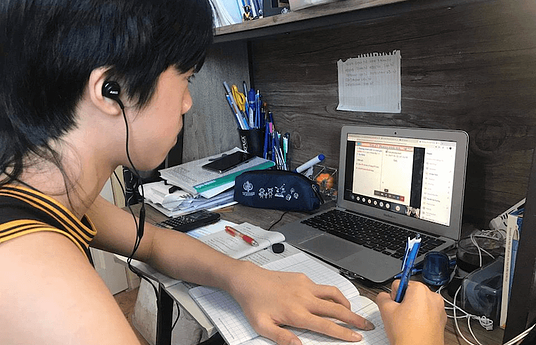Students, their parents and educators are feeling the extraordinary ripple effect of the novel coronavirus as schools shut down and quarantine methods are ordered amidst the public health emergency. In this series, we want to share best practices from our community and how our educators and innovators are managing school shutdowns, distance learning and more.
CURRENT UPDATE: Schools are now closed for at least the next 4 weeks at minimum and all teachers have been asked not to do any synchronous online learning due to access issues.
Lisa Gottfried, M. Ed., Teacher, 3D and Game Design/Videography, Napa (CA), USA
In Napa, we still have open schools for now. The teachers have been asked to take a PD day to prepare 2 weeks' worth of lessons that students can accomplish at home. We've had offers from Kahoot for free premium version Kahoot, KQED Learns, New Tech Network (only avail to schools in the network) to provide a library of lessons and online services that teachers and students can use. I've also seen offers from Everfi, but will not be taking advantage of that offer.
We are a 1:1 school and are assuming that all students have access to the internet. We already do so much online that we are more than halfway there toward teaching distance classes. We do run into issues where students who have Chromebooks have limited to no accessibility to certain pieces of software such as Adobe Creative Cloud. We are remaining conscious of that fact as we plan lessons. We will be making alternatives for those small groups of students who do not have access to the internet by printing out packets of material they can do without a computer.
Having had school closures due to the fires here in the Napa Valley, we are extremely aware of student trauma around this event and will not be proceeding as if it's just business as usual, but from a distance. Most teachers will not be asking students to do work related to the pandemic as we feel it will exacerbate the SEL toll on students. We are looking toward lessons and activities that are calming and joyful in nature.
At the college level, schools around the state are closing for the remainder of their quarters or semesters and they are working toward online learning to finish out their academic years.
I love how social media sites, like Facebook, have become a global platform for teachers to share resources and help. This post by Amy Young has really helped me a lot:
"So I attended a workshop to try to get us very quickly prepared to teach at a distance until the end of the month. There are a few things I've learned that I think are important to share:
1. Be kind to yourself and your students. Everyone is stressed, even if they're playing cool. That includes faculty. And that's okay.
2. Many universities have a considerable number of pedagogical experts that, quite frankly, I have only been dimly aware of until yesterday. Be kind to these people. They are suddenly very slammed.
3. There are a much larger number of faculty on university campuses that desperately need to retool. We have faculty who do not know how to use even the course management software that we've been on since I've been here (12 years). It is moments like this when that disparity becomes really fraught. It is also unacceptable.
4. You will not recreate your classroom, and you cannot hold yourself to that standard. Moving a class to a distance learning model in a day's time excludes the possibility of excellence. Give yourself a break.
5. Prioritize. What do students REALLY NEED TO KNOW in the next two weeks? This one is hard for me. But we have to strip it all the way down--in my campaigns class, that means I need them to post infographics on their research and now post narrative context and slides. But I'm going to punt on presentations because we just don't have time. Which sucks. But these are not normal circumstances.
6. If you're making videos, student viewership drops off precipitously at 5 minutes. Make them capsule videos if you do make them. And UPLOAD to YOUTUBE because it TRANSCRIBES for you. Do not assume your audio is good enough or that students can understand without transcription. This is like using a microphone at meetings--I don't care if you don't need it, someone else does and they don't want to ask.
7. Make assignments lower or no stakes if you're using a new platform. Get students used to just using the platform. Then you can do something higher stakes. Do not ask students to do a high stakes exam or assignment on a new platform.
8. Stay in contact with students, and stay transparent. Talk to them about WHY you're prioritizing certain things or asking them to read or do certain things. I've moved to doing that in all of my face-to-face teachings anyway, and it improves student buy-in because they know content and delivery are purposeful.
9. Do not read on best practices for distance learning. That's not the situation we're in. We're in triage. Distance learning, when planned, can be really excellent. That's not what this is. Do what you absolutely have to and ditch what you can. Thinking you can manage best practices in a day or a week will lead to feeling like you've failed.
10. Be particularly kind to your graduating seniors. They're already panicking, and this isn't going to help. If you teach a class where they need to have completed something for certification, to apply to grad school, or whatever, figure out plan B. But talk to them. Radio silence, even if you're working, is not okay.
And this is not something I learned in the workshop (some of these other things aren't either, they just make good sense), but for those in positions where they have to report on their year's activities, including teaching and service--REPORT ON THIS. We are, in real-time, doing very significant labor for the university at no additional compensation and with little training. Report on that in your activities for the year. Frame your work as both teaching AND service. You are helping put your university on more solid ground by doing this and doing this on the fly--that is LABOR. Frame it as such. I told every junior faculty person in my department to do this, especially and told them I would highlight that in my reports on them so it's repeatedly on record."
We thank our community members like Lisa Gottfried and teachers for doing the hard work, putting the students needs first and laboring their way to create resources on the fly. For more articles, innovations & resources, head to our Educator Toolkit especially designed to support educators & parents during this COVID-19 outbreak.






